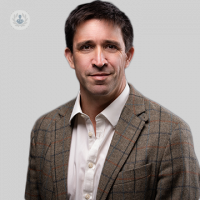What is a pharyngeal pouch?
Written in association with:A pharyngeal pouch is like a hernia at the top of your oesophagus. It can be problematic as food can collect in the pouch. What causes this phenomenon and how can it be fixed? Experienced consultant ear, nose & throat (ENT) surgeon Professor Stuart Winter is here to explain.

When food enters the oesophagus from the mouth, a sphincter (muscular valve) at the top of the oesophagus has to relax to let the food pass. The muscle called cricopharyngeus forms this valve or sphincter.
A pharyngeal pouch, also known as Zenker’s diverticulum, is where the wall of the oesophagus at the lower pharynx, just above the sphincter, balloons out under pressure.
This out-pouching may be caused by uncoordinated swallowing or a problem with the way the cricopharyngeus muscle contracts and relaxes. This may, in turn, be caused by chronic acid reflux.
In some cases, pouches cause no symptoms, but in other cases they can cause problems:
- food sticking in the pouch
- a gurgling sound in the neck after eating
- regurgitation of food
- aspiration – this is where ingested food comes back up and goes down into your lungs, which can lead to a chest infection
In the worst cases, the pouch gets so big that it becomes impossible to eat.
Treating pharyngeal pouches
Pharyngeal pouches are generally uncommon and, as such, it is important to find a surgeon who has experience of treating them.
Certain factors are important to consider when treating a patient with a pharyngeal pouch. Firstly, what are the problems the patient is having? What symptoms are they experiencing, if any? Some pouches are picked up during routine tests for other problems such as gastroscopy and do not need treatment.
Other important factors include the size of the pouch, the age of the patient, and what we hope to achieve by operating.
There is a wide range of treatment options. These include:
- endoscopic stapling technique – Dohlman’s procedure
- endoscopic laser treatment
- an open operation to close the pouch off
- cricopharyngeal myotomy – both laser and open techniques.
Find out how pharyngeal pouch surgery works
Professor Winter has extensive experience of all techniques and is able to offer a full range of options. Visit his Top Doctors profile to book an appointment or learn more about ENT surgery.


